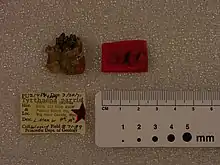Tytthaena
Tytthaena ("little hyena") is an extinct genus of placental mammals from extinct subfamily Tytthaeninae within extinct family Oxyaenidae, that lived in North America from the late Paleocene to early Eocene.[1]
| Tytthaena | |
|---|---|
 | |
| part of left maxilla of Tytthaena parrisi | |
| Scientific classification | |
| Domain: | Eukaryota |
| Kingdom: | Animalia |
| Phylum: | Chordata |
| Class: | Mammalia |
| Clade: | Pan-Carnivora |
| Order: | †Oxyaenodonta |
| Family: | †Oxyaenidae |
| Subfamily: | †Tytthaeninae Gunnell & Gingerich, 1991[2] |
| Genus: | †Tytthaena Gingerich, 1980[3] |
| Type species | |
| †Tytthaena parrisi Gingerich, 1980 | |
| Species | |
| Synonyms | |
|
synonyms of subfamily:
synonyms of genus:
synonyms of species:
| |
Description
Tytthaena is the smallest oxyaenid known. Morphologically, it resembles Oxyaena. It can be distinguished from other oxyaenids by its size and dentition. Its molars were narrow, with elongate talonids.[3][4]
Phylogeny
The phylogenetic relationships of genus Tytthaena are shown in the following cladogram.[2][6][7][8]
| Pan-Carnivora |
| |||||||||||||||||||||||||||||||||||||||||||||||||||||||||||||
See also
References
- "Tytthaena". Fossilworks.
- Gunnel, Gregg F.; Gingerich, Philip D. (1991). "Systematics and evolution of late Paleocene and early Eocene Oxyaenidae (Mammalia, Creodonta) in the Clarks Fork Basin, Wyoming" (PDF). Contributions from the Museum of Paleontology. The University of Michigan. 28 (7): 141–180.
- P. D. Gingerich. (1980.) "Tytthaena parrisi, Oldest Known Oxyaenid (Mammalia, Creodonta) from the Late Paleocene of Western North America." Journal of Paleontology 54(3):570-576
- K. D. Rose. (1981.) "The Clarkforkian Land-Mammal Age and Mammalian Faunal Composition Across the Paleocene-Eocene Boundary." University of Michigan Papers on Paleontology 26:1-197
- A. V. Lavrov (1999.) "Adaptive Radiation of Hyaenodontinae (Creodonta, Hyaenodontidae) of Asia." in 6th Congress of the Theriological Society, Moscow, April 13–16, p. 138 [in Russian].
- Solé, F. & Ladevèze, S. (2017.) "Evolution of the hypercarnivorous dentition in mammals (Metatheria, Eutheria) and its bearing on the development of tribosphenic molars." Evolution & Development, 19(2), 56–68.
- Prevosti, F. J. & Forasiepi, A. M. (2018.) "Introduction. Evolution of South American Mammalian Predators During the Cenozoic: Paleobiogeographic and Paleoenvironmental Contingencies"
- Shawn P. Zack (2019). "A skeleton of a Uintan machaeroidine 'creodont' and the phylogeny of carnivorous eutherian mammals". Journal of Systematic Palaeontology. 17 (8): 653–689. doi:10.1080/14772019.2018.1466374. S2CID 89934728.
This article is issued from Wikipedia. The text is licensed under Creative Commons - Attribution - Sharealike. Additional terms may apply for the media files.